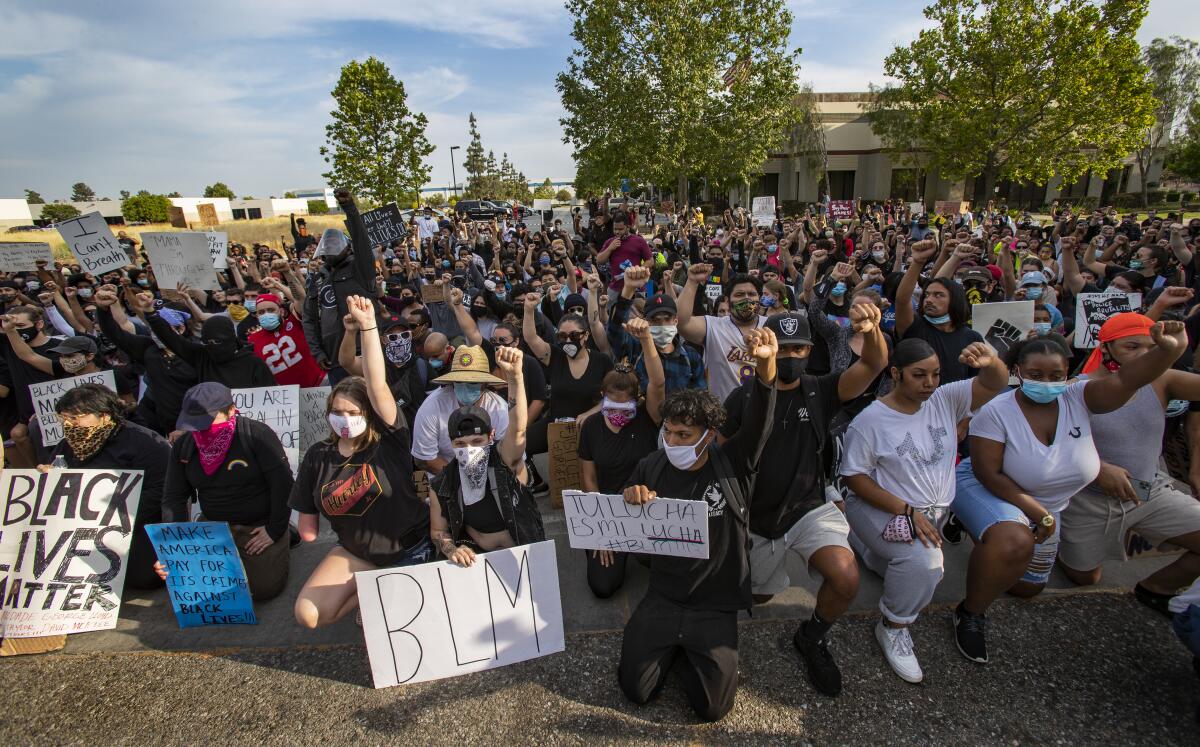So much for California’s racial reckoning. Voters reject affirmative action - again

- Share via
Despite a summer of racial reckoning, when Californians marched in the streets to demand justice and equality, voters decided Tuesday not to help dismantle the racism baked into our state institutions. It wasn’t a close call, either; Proposition 16, a measure that would have removed a 24-year-old prohibition on affirmative action by state and local agencies, was rejected by more than 1 million votes.
What a shame, and what a missed opportunity. It’s a reminder too that while California is often viewed as a progressive bastion, the state and its electorate are still fairly conservative when it comes to confronting racial inequity.
Proposition 16 would have allowed public agencies in California to once again grant preferential treatment to individuals or groups based on “race, sex, color, ethnicity or national origin.” With the measure trailing, 56% to 44%, in the unofficial tally Wednesday, its sponsors all but conceded defeat.
Proposition 16 would have repealed Proposition 209, the ballot measure voters approved in 1996 to ban affirmative action programs by governments and public institutions. The ban set back the state’s efforts to promote diversity. Getting rid of Proposition 209 would have allowed — but not required — public universities and government agencies in California to consider race and gender when admitting students, hiring employees and awarding contracts.
Proposition 209 was one of several ballot measures passed in the 1990s that took aim at the Latino immigrant community. Yet Latino voters were ambivalent about the measure, and possibly confused over what it might mean for individuals.
There was also considerable debate over who would win and who would lose if affirmative action was revived. Some in the Asian American community oppose a return of affirmative action, fearing that it would come at their expense. After more than two decades without state and local government affirmative action programs in California, the idea of giving preferences to disadvantaged groups didn’t exactly resonate with many voters.
The debate over Proposition 16 focused on the University of California. After Proposition 209 passed, the UC system adopted a more holistic approach to diversifying its admissions, trying to bring in more nonwhite students by targeting low-income households and applicants who would be the first in their family to attend college. But the student acceptance rate still doesn’t adequately represent the state’s diversity. And because Proposition 209 barred state employers from recruiting or hiring people based on their race, the demographics of the UC faculty don’t mirror California’s population. In 2019, less than 3% of the faculty was Black and only about 7% was Latino.
The campaign’s narrow focus on the UC system missed the larger damage wrought by Proposition 209. The affirmative action ban halted efforts by state and local governments to give preference in hiring and contracting to underrepresented groups. Businesses owned by women and underrepresented racial and ethnic groups often lack the same access to capital and connections as other firms.
Americans like to believe that this country is a meritocracy, where anyone can excel with sufficient grit and tenacity. But that ignores the institutional racism baked into our society that disadvantages people of color. It ignores the systemic inequities that we are seeing play out in front of our own eyes, in the killing of George Floyd and other Black people by police and in the COVID-19 pandemic, which has disproportionately hit Black and Latino families.
Proposition 16 wouldn’t have magically ended racial inequality in California, but it would have given the state’s institutions a valuable tool to address it. California is one of just eight states that don’t allow public affirmative action programs. Our institutions continue to be hobbled by this unnecessary prohibition. For now at least, the only answer is for public schools and agencies to continue to root out institutional racism and address disparities in all forms.
We still have so much work to do if California, and our country, ever are to become the meritocracy that we claim them to be.
More to Read
A cure for the common opinion
Get thought-provoking perspectives with our weekly newsletter.
You may occasionally receive promotional content from the Los Angeles Times.









